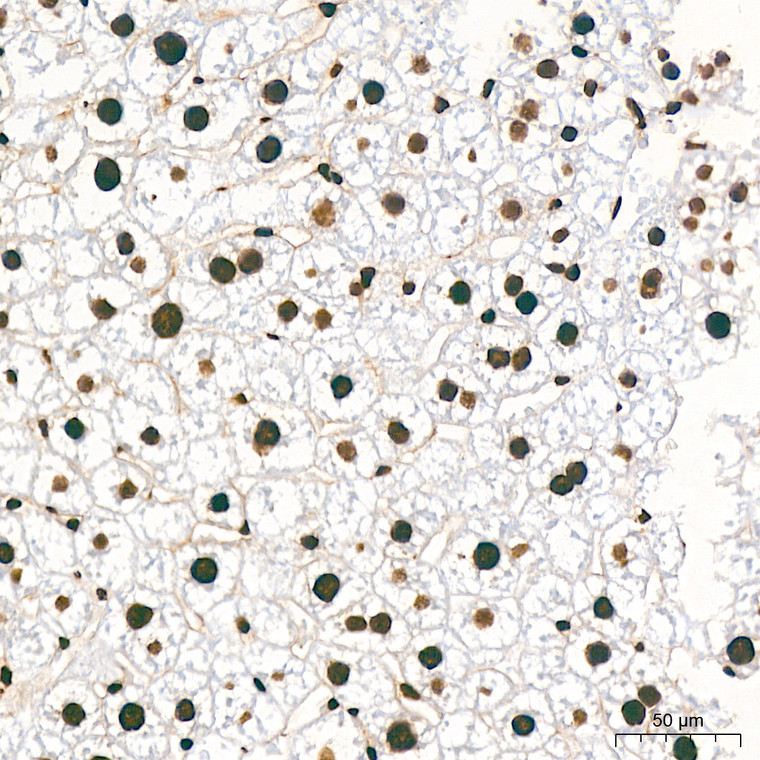| Host: |
Rabbit |
| Applications: |
WB/IHC/IF |
| Reactivity: |
Human/Mouse/Rat |
| Note: |
STRICTLY FOR FURTHER SCIENTIFIC RESEARCH USE ONLY (RUO). MUST NOT TO BE USED IN DIAGNOSTIC OR THERAPEUTIC APPLICATIONS. |
| Short Description: |
Rabbit monoclonal antibody anti-hnRNP K (1-100) is suitable for use in Western Blot, Immunohistochemistry and Immunofluorescence research applications. |
| Clonality: |
Monoclonal |
| Clone ID: |
S5MR |
| Conjugation: |
Unconjugated |
| Isotype: |
IgG |
| Formulation: |
PBS with 0.02% Sodium Azide, 0.05% BSA, 50% Glycerol, pH7.3. |
| Purification: |
Affinity purification |
| Dilution Range: |
WB 1:500-1:1000IHC-P 1:50-1:200IF/ICC 1:50-1:200 |
| Storage Instruction: |
Store at-20°C for up to 1 year from the date of receipt, and avoid repeat freeze-thaw cycles. |
| Gene Symbol: |
HNRNPK |
| Gene ID: |
3190 |
| Uniprot ID: |
HNRPK_HUMAN |
| Immunogen Region: |
1-100 |
| Immunogen: |
A synthetic peptide corresponding to a sequence within amino acids 1-100 of human hnRNP K (P61978). |
| Immunogen Sequence: |
METEQPEETFPNTETNGEFG KRPAEDMEEEQAFKRSRNTD EMVELRILLQSKNAGAVIGK GGKNIKALRTDYNASVSVPD SSGPERILSISADIETIGEI |
| Post Translational Modifications | Arg-296 and Arg-299 are dimethylated, probably to asymmetric dimethylarginine. Sumoylated by CBX4. Sumoylation is increased upon DNA damage, such as that produced by doxorubicin, etoposide, UV light and camptothecin, due to enhanced CBX4 phosphorylation by HIPK2 under these conditions. Ubiquitinated by MDM2. Doxorubicin treatment does not affect monoubiquitination, but slightly decreases HNRNPK poly-ubiquitination. O-glycosylated (O-GlcNAcylated), in a cell cycle-dependent manner. |
| Function | One of the major pre-mRNA-binding proteins. Binds tenaciously to poly(C) sequences. Likely to play a role in the nuclear metabolism of hnRNAs, particularly for pre-mRNAs that contain cytidine-rich sequences. Can also bind poly(C) single-stranded DNA. Plays an important role in p53/TP53 response to DNA damage, acting at the level of both transcription activation and repression. When sumoylated, acts as a transcriptional coactivator of p53/TP53, playing a role in p21/CDKN1A and 14-3-3 sigma/SFN induction. As far as transcription repression is concerned, acts by interacting with long intergenic RNA p21 (lincRNA-p21), a non-coding RNA induced by p53/TP53. This interaction is necessary for the induction of apoptosis, but not cell cycle arrest. As part of a ribonucleoprotein complex composed at least of ZNF827, HNRNPL and the circular RNA circZNF827 that nucleates the complex on chromatin, may negatively regulate the transcription of genes involved in neuronal differentiation. |
| Protein Name | Heterogeneous Nuclear Ribonucleoprotein KHnrnp KTransformation Up-Regulated Nuclear ProteinTunp |
| Database Links | Reactome: R-HSA-4570464Reactome: R-HSA-72163Reactome: R-HSA-72203Reactome: R-HSA-9610379 |
| Cellular Localisation | CytoplasmNucleusNucleoplasmCell ProjectionPodosomeRecruited To P53/Tp53-Responsive PromotersIn The Presence Of Functional P53/Tp53In Case Of Asfv InfectionThere Is A Shift In The Localization Which Becomes Predominantly Nuclear |
| Alternative Antibody Names | Anti-Heterogeneous Nuclear Ribonucleoprotein K antibodyAnti-Hnrnp K antibodyAnti-Transformation Up-Regulated Nuclear Protein antibodyAnti-Tunp antibodyAnti-HNRNPK antibodyAnti-HNRPK antibody |
Information sourced from Uniprot.org
12 months for antibodies. 6 months for ELISA Kits. Please see website T&Cs for further guidance















![Western blot analysis of various lysates using [KO Validated] MEK2 Rabbit monoclonal antibody (STJ11101615) at 1:1000 dilution. Secondary antibody: HRP Goat Anti-Rabbit IgG (H+L) (STJS000856) at 1:10000 dilution. Lysates/proteins: 25 Mu g per lane. Blocking buffer: 3% nonfat dry milk in TBST. Detection: ECL Basic Kit. Exposure time: 1s. Western blot analysis of various lysates using [KO Validated] MEK2 Rabbit monoclonal antibody (STJ11101615) at 1:1000 dilution. Secondary antibody: HRP Goat Anti-Rabbit IgG (H+L) (STJS000856) at 1:10000 dilution. Lysates/proteins: 25 Mu g per lane. Blocking buffer: 3% nonfat dry milk in TBST. Detection: ECL Basic Kit. Exposure time: 1s.](https://cdn11.bigcommerce.com/s-zso2xnchw9/images/stencil/300x300/products/90529/360110/STJ11101615_1__89635.1713124721.jpg?c=1)


